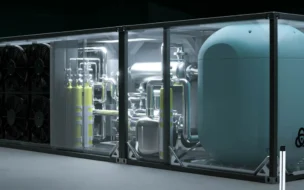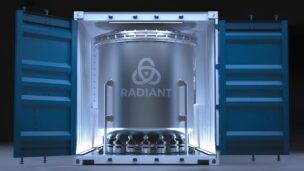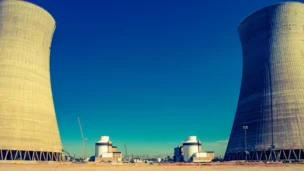In the global race toward an emissions-free transportation sector, commercial shipping presents a particular challenge—massive cargo ships depend on toxic, carbon-spewing heavy fuel oil, which they need loads of for their long journeys.
An idea first floated in the 1950s could offer a green, high-tech solution: nuclear-powered ships.
Nuclear never fully took off on the seas due to high maintenance costs and safety concerns. Currently, the tech is only used in icebreakers, submarines and a sole Russian cargo vessel that sparked a fire last December.
Companies around the globe think newer reactor technologies could offer smoother sailing. Nuclear cargo ships could deliver longer range, quicker trips, and less refueling. Using nuclear could also accelerate the transition from petroleum-derived fuels by eliminating a major motivation for oil production.
“Without decarbonizing the marine industry, there will be no decarbonization solution for society,” Jan Emblemsvåg, a professor of ocean operations and civil engineering at the Norwegian University of Science and Technology, told Ignition.
Unique reactor designs: Emblemsvåg leads a project called NuProShip, which has enlisted Norwegian stakeholders in government, academia, and industry to develop a Generation IV SMR fit for international shipping. He and his teammates have narrowed down the designs to three types:
- Molten-salt-cooled reactors
- Uranium-fueled, helium-gas-cooled reactors
- Lead-cooled fast reactors
Ultimately, the reactor would create steam to spin turbines and stir up electricity for the ship’s motors. “The [reactor designs] that are left have very limited issues,” Emblemsvåg said. “They have all the typical Generation IV reactor benefits, but in addition, they satisfy shipping.”
Emblemsvåg recently announced agreements with reactor vendors including Seattle-based Ultra Safe Nuclear and California-based Kairos Power, and plans to host a nuclear propulsion conference in June.
Deals, deals, deals: Other major players are getting in on the action. London-based Newcleo has joined the nuclear shipping race with its lead-cooled SMR concept and expects to finish its feasibility study with the Italian shipbuilding company Fincantieri later this year. Last month, Netherlands-based nuclear energy development and consultancy company ULC-Energy said it had wrapped up a study on reactor designs, and HD Korea Shipbuilding and Offshore Engineering is collaborating with nuclear reactor developers from the UK and US, including Core Power and TerraPower.
Bumps ahead: While next-generation reactors may prove safer and cheaper to build than existing ship-based designs, they could still prove risky in choppy water—not to mention the risk of piracy. Above all, though, Emblemsvåg sees policy as the largest hurdle.
“The main challenge will be the fact that different countries have different regulatory regimes,” he said. “It is therefore critical to harmonize different regulatory regimes internationally.”




